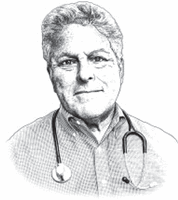
The evolution of our understanding of human disease has been a remarkable journey, spanning centuries of scientific progress and shifting paradigms. Illness was originally attributed to the imbalance of bodily fluids or the involvement of evil humors and miasmas, concepts rooted in superstition and religious beliefs.
Over centuries, a usually more scientific and technologically focused understanding of disease has emerged. The germ theory revolutionized our understanding of infections. Advances in molecular biology and genetics have provided insights into pathophysiology, and in some areas of medicine we are able to practice personalized care utilizing our knowledge of immunology and molecular pharmacology to deliver targeted therapies.
So it seems somewhat ironic that when faced with common, complex, and confounding syndromes that we can’t fully explain, we revert to attributing them to a current iteration of an evil humor: autoimmunity. Our strides in understanding well-defined autoimmune diseases have been huge, with the development of dozens of extremely effective therapies directed at immune mechanisms. Every subspecialty in medicine has benefited from these advances. But perhaps these successes have made us too willing to attribute yet-unexplained conditions to autoimmunity simply because they share symptomatology (often nonspecific) with defined systemic disorders such as systemic lupus erythematosus (SLE).
Postural orthostatic tachycardia syndrome (POTS), as discussed by Aboseif et al1 in this issue of the Journal, is a clinically defined positional intolerance syndrome. Our understanding of its pathophysiology is incomplete. Patients often can temporally link the onset or worsening of their cardiovascular (positional) symptoms to a medical or stressful life event, but additional discussion often reveals that many other symptoms that seem to be associated with POTS had been present prior to recognition of the tachycardia. It is the presence of these other symptoms—symptoms also common in patients with chronic inflammatory syndromes—that prompts patients and their physicians to search for another underlying systemic condition,2 or to attribute the cause of POTS (and related disorders) to autoimmunity.
I am seeing more and more patients in the clinic referred with a diagnosis of POTS or dysautonomia and “autoimmune disease.” The autoimmune concern is frequently fueled by the finding of a positive antinuclear antibody (ANA) or SSA antibody, often at a low level. The symptoms that prompted the initial search for autoantibodies as a reflection of a possible autoimmune process often included some combination of fatigue, brain fog, generalized pain without objective findings, irritable bowel syndrome, bladder dysfunction, exertional intolerance, dysesthesias, dry eyes, and dry mouth. These symptoms are also shared by many patients diagnosed with fibromyalgia and are often exacerbated after acute medical illnesses such as Lyme disease, mononucleosis, and COVID-19 infection (aka long COVID). And while many of these symptoms are present in patients with SLE, multiple sclerosis, Sjögren syndrome, and inflammatory bowel disease, they are not disease-defining symptoms. Plus, as background, it must be remembered that a positive and usually low-titer ANA test can be detected in roughly 20% of young women.
There is much about fibromyalgia, POTS, and myalgic encephalomyelitis that we do not understand, including the frequent link with major stressors earlier in life in many but certainly not all patients. The potential role of a viral vector persisting within select nerve cells or microglia3 after an infection in some patients with chronic fatigue and other symptoms cannot be totally dismissed as a pathogenic contributor, but at present we cannot test or treat for this. Many patients with chronic systemic inflammatory disorders report similar symptoms, but this does not imply that all patients with SLE and related syndromes have chronic viral infections any more than implying that patients with POTS who share these symptoms have SLE. The fact that rare patients with Sjögren syndrome have been reported to have a sensory ganglionopathy or marked dysautonomia should not imply that patients with any symptoms suggesting autonomic dysregulation should be tested for the presence of nonspecific autoantibodies such as SSA (associated with, but not specific to the diagnosis of Sjögren). That many of these patients display features of autonomic dysfunction is of interest given our burgeoning understanding of the interplay between vagal nerve activity and inflammation,4 but our understanding of this at present is far too limited to do any more than recognize intriguing relationships and possible therapeutic pathways.
At present, in patients with POTS and related syndromes, there is no reproducibly documented pathogenic antibody, laboratory abnormality, or histopathologic finding of inflammation akin to what we document in patients with defined systemic autoimmune diseases. I strongly agree with Aboseif et al1 that there are yet no convincing data that warrant institution of immunosuppressive or immunomodulatory therapy in our patients with POTS. I would go further and say that a random search for autoantibodies in the absence of specific physical findings or suggestive laboratory studies (leukopenia, thrombocytopenia, adenopathy, neuropathy), outside of an organized clinical study, is not likely to be in the patient’s best interest, and is more likely to trigger a flurry of additional tests and anxiety. There are indeed shared symptoms between patients with POTS and those with defined systemic autoimmune diseases (eg, SLE, Sjögren), but those symptoms are not the symptoms that define these autoimmune disorders and thus should not be invoked as evidence for the presence of autoimmunity. And if an autoantibody is detected, it is not proof of causation warranting therapeutic intervention.
We have a lot more to learn about the pathogenesis of POTS—and about autoimmune diseases. Clinical studies and interventional trials are being done. This may change, but for the moment, I am not convinced that the two are linked.
- Copyright © 2023 The Cleveland Clinic Foundation. All Rights Reserved.






